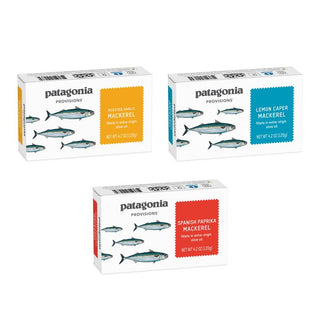What Is Mackerel?
For starters, mackerel isn’t just one fish. There are dozens of different mackerel species—Sierra, King, Spanish, Atlantic—all belonging to the Scombridae family.
Most canned mackerel are the small, mild, meaty Atlantic mackerel. That’s the kind of mackerel we’ll be talking about in this article.

Mackerel fresh from the sea. Santoña, Spain. Amy Kumler
Is Mackerel Good for You?
In short, yes. These little silver swimmers benefit your brain, heart and muscles as well as cell function throughout your entire body. Here’s a few specific reasons to give mackerel a try.
Helps keep the brain and nervous system healthy
Mackerel is rich in omega-3 fatty acids—a type of polyunsaturated fat found in each of your cells, supporting their healthy function. Omega-3s are crucial to brain development in utero and early childhood, and may even help prevent Attention-Deficit/Hyperactivity Disorder (ADHD). Mackerel also provide choline, a nutrient involved in regulating memory, mood and muscle control.
Promotes heart health
The two best-known types of omega-3s, EPA (eicosapentaenoic acid) and DHA (docosahexaenoic acid), have proven especially effective at protecting the heart. According to the Food and Agriculture Organization of the United Nations, a daily intake of 250 milligrams of EPA and DHA reduces the risk of developing cardiovascular disease. When you consider that 100 grams of mackerel contains 898 mg of EPA and 1,401 mg of DHA, it’s no wonder the American Heart Association recommends adults eat two servings per week.
May protect against type 2 diabetes
According to a study in the journal Nature Reviews Cardiology, polyunsaturated fatty acids—abundant in mackerel—have been shown to reduce the risk of developing type 2 diabetes.
Builds and repairs muscles
Eating about 20 grams of protein before going to bed gives your body protein to build and repair muscles while you sleep. Mackerel’s high protein content of well over 20 grams per serving makes it a healthy bedtime snack (sounds weird, we know, but you can’t argue with science). Mackerel is also a source of the amino acids called leucines, which promote muscle growth too.

Nothing beats a high protein bedtime snack! Tim Davis
The Nutritional Benefits of Mackerel
According to the USDA, a 100-gram serving of cooked Atlantic mackerel contains:
23.8 g protein
15 mg calcium
1.57 mg iron
97 mg magnesium
278 mg phosphorus
401 mg potassium
51.6 mg selenium
80.4 mg choline
19 mcg (micrograms) B12
1010 IU vitamin D (D2+D3)
2.38 mg vitamin E
898 mg EPA omega-3s
1,401 mg DHA omega-3s

Amy Kulmer
Is Mackerel High in Mercury?
Atlantic mackerel contain relatively little mercury, according to the FDA and the EPA, and it’s safe to eat them two or three times a week. Their short lifespan and plankton diet means they don’t accumulate the high levels of toxic heavy metals found in larger, apex-predator fish such as swordfish.
Is Canned Mackerel Good for You?
Yes. Mackerel that’s been cooked and preserved by canning retains all the health benefits of fresh mackerel, including those vital omega-3 fatty acids and protein. Also, canned mackerel is ready to eat and easy to grab from your pantry or pack, so chances are you’ll get its benefits more often.
Most canned mackerel is salted and highly flavorful, so the recommended serving size is small. Keep an eye on how much you eat if sodium is an issue for you—the daily limit for sodium is 3-5 grams, less if you have high blood pressure.
So What Does Mackerel Taste Like?
A bit like tuna, but milder in flavor. If you’re not a fan of fishy-tasting fish, try canned mackerel.
How Do I Eat Canned Mackerel?
Either straight out of the can, or just like you’d eat canned tuna. Toss the plump little fillets into a niçoise salad, flake them up for a mackerel melt sandwich or add to pasta—and that’s just for starters.












